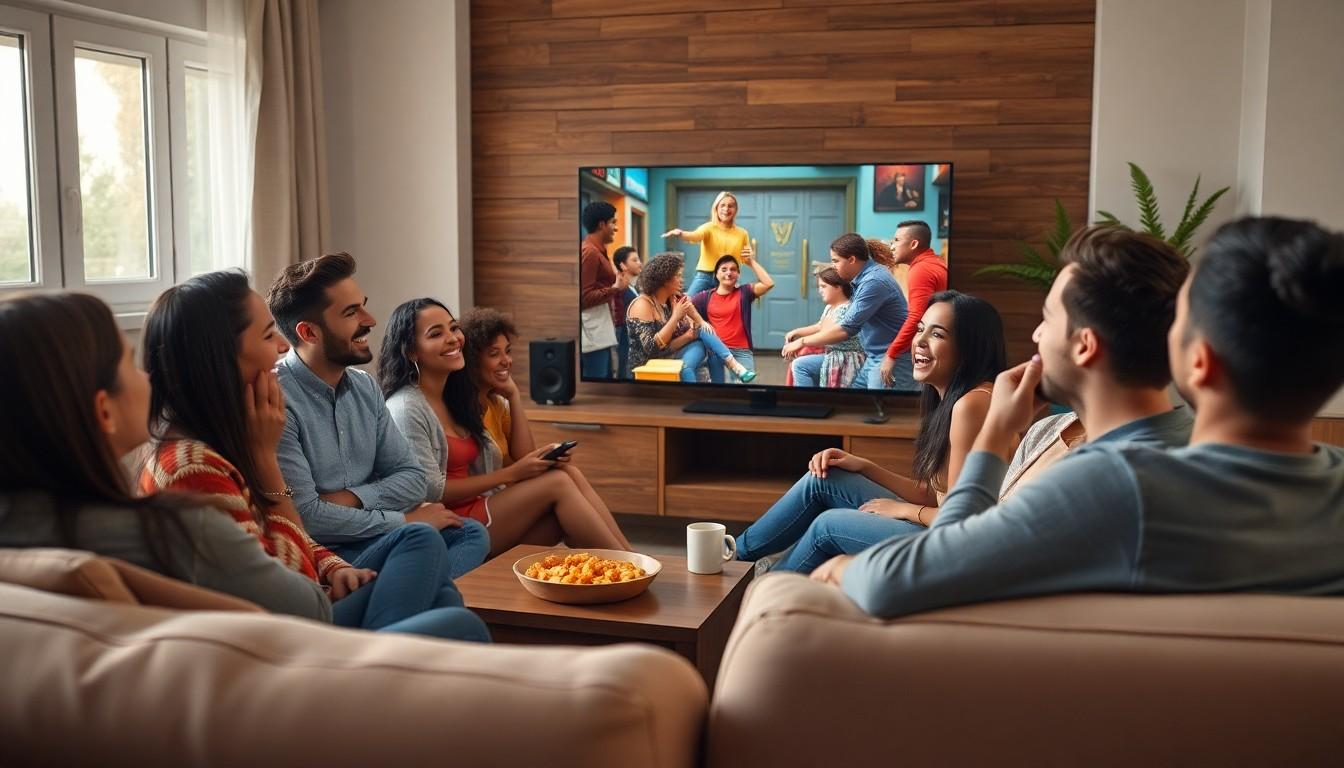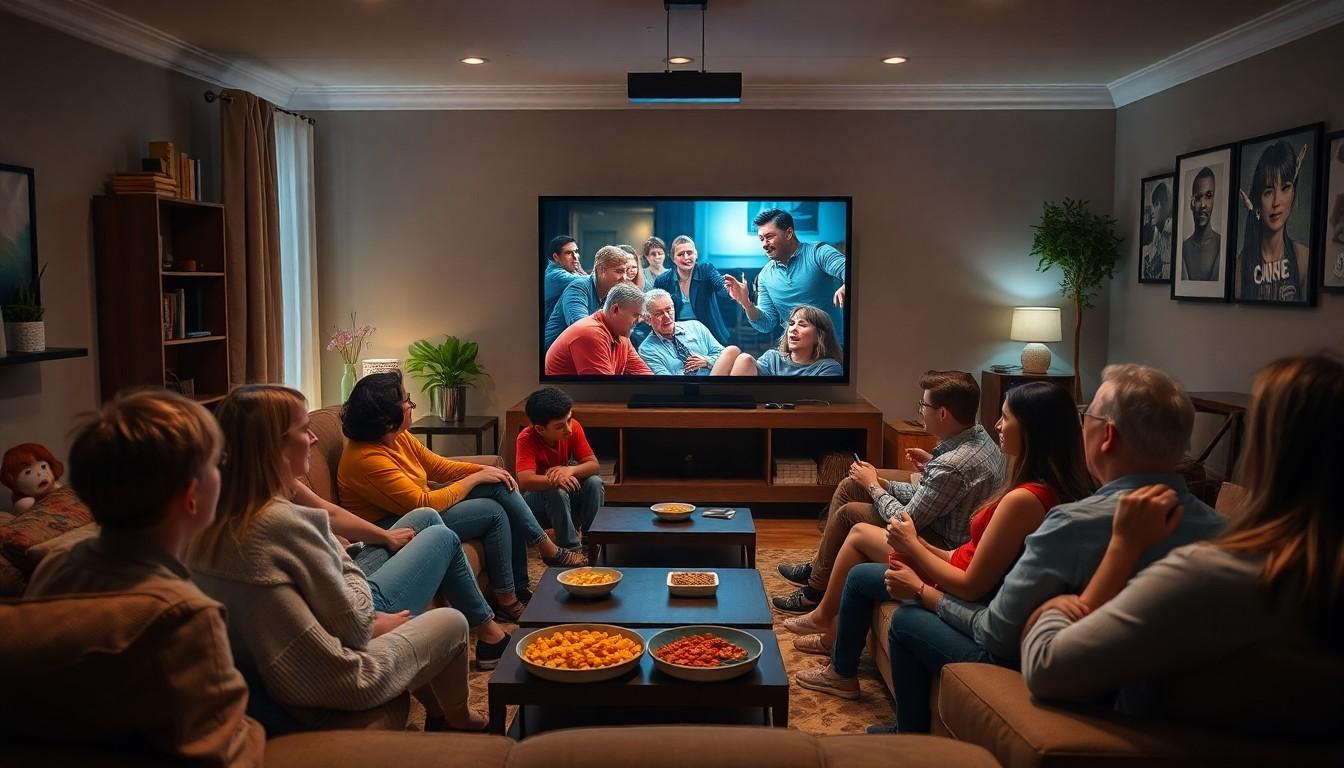
Media as Entertainment: How It Shapes Our Stories and Connects Us Today
In a world where scrolling through endless feeds feels like an Olympic sport, media has transformed into the ultimate entertainment powerhouse. From binge-worthy series that keep viewers glued to their couches to viral videos that spark laughter in the most mundane moments, the way people consume media has never been more captivating.
With a click of a button, anyone can dive into a universe filled with drama, comedy, and even the occasional cat video that steals the show. It’s not just about watching; it’s about experiencing stories that resonate, entertain, and sometimes even make you question your life choices—like that time you watched a 12-hour documentary on cheese. So buckle up as we explore how media has become the go-to source for entertainment in our fast-paced lives, and why it’s here to stay.
Media As Entertainment
Media serves as a primary source of entertainment, engaging audiences through various formats. From streaming services to social media, it shapes how individuals connect with stories and each other.
Definition and Scope
Media as entertainment encompasses multiple formats, including television shows, films, podcasts, and digital content. This broad definition includes any form of storytelling intended for enjoyment, capturing attention and evoking emotions. Interactive elements from video games enhance user engagement, allowing for active participation. Social media platforms, such as TikTok and Instagram, also play a critical role, offering short-form content that entertains while disseminating information quickly. Overall, media functions as both an escape and a reflection of cultural trends, influencing societal norms and personal behaviors.
Historical Context
Media’s evolution into a key entertainment source began with early forms of storytelling, such as theater and oral traditions. The advent of radio in the 20th century revolutionized entertainment by bringing music and stories into homes. Television further transformed media, providing a visual experience that captivated audiences. The introduction of the internet altered the landscape drastically, allowing on-demand access to various content. Today, streaming platforms dominate, offering diverse programming tailored to individual preferences. Cultural shifts over time signify media’s ability to adapt, making it an essential aspect of everyday life.
Types Of Media In Entertainment

Media encompasses various formats that engage audiences and provide entertainment. Each type delivers unique experiences and appeals to different interests.
Television and Film
Television shows and films dominate the entertainment landscape. Streaming platforms like Netflix and Hulu offer a myriad of series and movies that cater to diverse tastes. Viewers often binge-watch these series, immersing themselves in compelling narratives. Feature films frequently attract large audiences during theatrical releases, showcasing storytelling and visual artistry. Documentaries have also gained popularity, educating while entertaining. Whether through scripted dramas or reality shows, this medium remains a staple of modern entertainment.
Music and Streaming Services
Streaming services revolutionized how people consume music. Platforms such as Spotify and Apple Music provide extensive libraries, allowing users to explore various genres and artists. Playlists curated for specific moods or activities enhance the listening experience. Each track often showcases exceptional talent, contributing to the popularity of individual artists. Music videos on platforms like YouTube further amplify engagement, merging audio with visual storytelling. Tools like an AI music generator also contribute to this shift, offering new ways to create personalized and relatable content. The accessibility of music through these services has transformed listening habits, making entertainment more personalized and relatable.
Video Games and Interactive Media
Video games represent a dynamic sector of entertainment. Titles range from single-player experiences to multiplayer online environments, engaging players worldwide. Immersive storylines provide players with unique narratives that evolve based on their choices. Virtual reality systems enhance this experience, creating lifelike worlds for players to explore. Additionally, mobile games have surged in popularity, bringing entertainment to handheld devices. E-sports events showcase competitive gaming, attracting large audiences and fostering community engagement. Overall, interactive media continues redefining entertainment with creativity and innovation.
The Impact Of Media As Entertainment
Media functions as a powerful influence in today’s society. It shapes cultural norms and drives trends across various demographics.
Cultural Influence
Media plays a pivotal role in reflecting and molding societal values. Through storytelling, films provide representation and challenge stereotypes. Television series frequently address contemporary issues, encouraging discussions around identity and social justice. Streaming platforms amplify diverse voices, showcasing narratives from different cultures. Audiences often connect with content that resonates with their experiences, fostering a sense of community. The popularity of global hits, such as K-dramas and telenovelas, illustrates the universal appeal of compelling stories.
Psychological Effects
Media consumption significantly impacts individual psychology. Engaging narratives evoke strong emotional responses, facilitating empathy and understanding. Binge-watching creates a temporary escape, allowing viewers to immerse themselves in alternate realities. Regular exposure to media content can shape perceptions of reality and influence behaviors. Research shows that excessive media consumption may lead to anxiety or depression. Positive content, however, promotes well-being through humor and uplifting stories, leading individuals to seek solace in familiar characters or motivational themes.
Social Interaction
Media functions as a catalyst for social interaction. Friends and family bond over shared cinematic experiences, whether in theaters or at home. Social media platforms enable users to engage in discussions about their favorite shows or movies, fostering connections. Online gaming communities create friendships among players, uniting them over shared interests. Virtual events, such as watch parties, enhance collective viewing experiences. As a result, media not only entertains but also strengthens relationships, encouraging collaboration and dialogue across diverse groups.
The Future Of Media As Entertainment
Media as entertainment continues to evolve rapidly, influenced by various factors including technological advancements and shifting audience preferences.
Emerging Technologies
Innovations such as virtual reality (VR) and augmented reality (AR) redefine immersive experiences. They allow users to interact with stories in innovative ways, enhancing engagement. Streaming technologies increase accessibility, providing audiences with on-demand content that fits their schedules. Moreover, artificial intelligence (AI) curates personalized recommendations, catering to individual tastes and preferences. Blockchain technology offers content creators secure avenues for monetization and distribution, ensuring creators retain control over their work. These technologies shape how audiences consume media, paving the way for more interactive and engaging forms of entertainment.
Trends to Watch
Digital streaming’s dominance represents a significant trend in media consumption. More viewers are shifting away from traditional television, preferring platforms like Netflix, Hulu, and Disney+. Short-form content’s rise through platforms such as TikTok and Instagram reflects changing attention spans and viewing habits. Additionally, the emergence of podcasts continues to grow, with listeners desiring information and entertainment during everyday tasks. Social media’s role in disseminating content emphasizes the importance of audience interaction and community building. Gamification in media also engages users, blurring the lines between gaming and traditional storytelling, enhancing overall entertainment experiences.
Experiences and Meaningful Narratives
Media’s role as entertainment is more significant than ever. It shapes cultural narratives while offering immersive experiences that resonate with audiences. The evolution of storytelling through various formats keeps viewers engaged and fosters community connections.
As technology advances, media will continue to adapt and redefine entertainment. The rise of interactive elements and personalized content ensures that audiences remain captivated. Understanding media’s impact on society and individual well-being is crucial as it evolves. This dynamic landscape promises to keep pushing boundaries and enriching lives through shared experiences and meaningful narratives.



